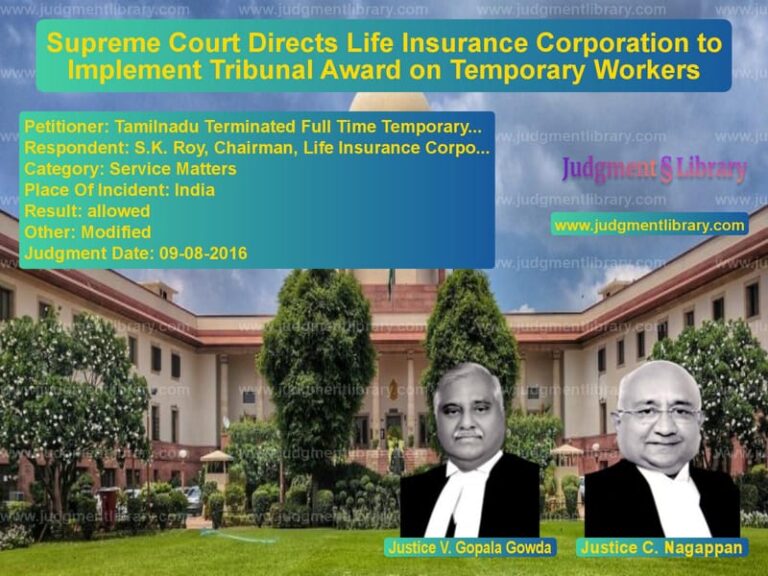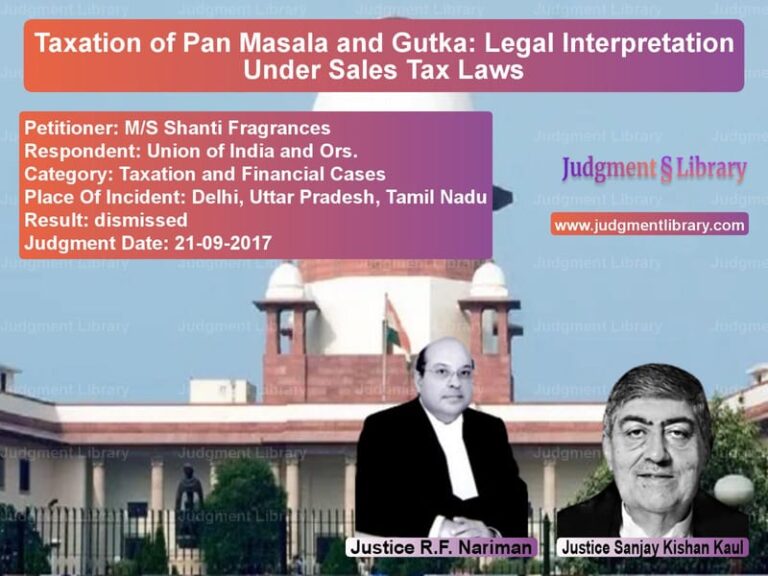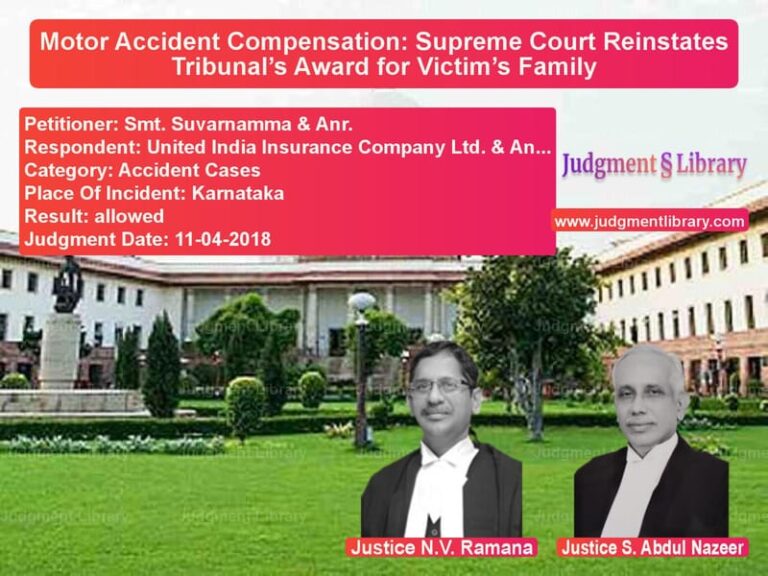Arbitration Clause and Non-Arbitrability: Supreme Court Clarifies Scope of Section 11 Petitions
The Supreme Court, in Mohammed Masroor Shaikh vs. Bharat Bhushan Gupta & Others, delivered a crucial ruling on the interpretation of arbitration clauses and the non-arbitrability of disputes under Section 11 of the Arbitration and Conciliation Act, 1996. The judgment clarifies the extent to which courts can intervene when disputes arise regarding arbitration agreements.
Background of the Case
The case involved disputes between the partners of multiple firms—M/s M.M. Developers, Nisarga; M/s M.M. Developers, Shanti Nagar; and M/s M.M. Developers, Shramjivi. The firms executed a retirement-cum-continuation deed on 12 September 2014, which included an arbitration clause (Clause 19) for resolving disputes.
Respondent No.1 (Bharat Bhushan Gupta) served a legal notice invoking arbitration on 18 February 2019, but the other partners (including the appellant, Mohammed Masroor Shaikh) did not respond. Consequently, Bharat Bhushan Gupta filed a petition under Section 11 of the Arbitration Act before the Bombay High Court, seeking the appointment of an arbitrator.
On 6 March 2020, a Single Judge of the Bombay High Court allowed the petition and appointed an arbitrator. The appellant challenged this decision before the Supreme Court, arguing that no valid arbitration agreement existed and that the claims were time-barred.
Arguments by the Parties
Petitioner’s Arguments (Mohammed Masroor Shaikh)
- The arbitration clause did not apply to disputes between a retiring partner and the continuing partners.
- The petition under Section 11 was not served on the appellant, and no notice of hearing was issued by the Bombay High Court.
- The appellant was admitted to the hospital during the relevant period and was unable to contest the arbitration proceedings.
- The claims raised by Bharat Bhushan Gupta were time-barred and should have been dismissed.
- The appellant’s advocate was present before the arbitrator under protest and had challenged the arbitration proceedings under Section 34 of the Arbitration Act.
Respondent’s Arguments (Bharat Bhushan Gupta & Others)
- The arbitration clause in the retirement deed explicitly covered all disputes among the partners.
- The appellant was served with a legal notice in 2019 but chose not to respond, leading to the petition under Section 11.
- The appellant had participated in the arbitration proceedings by appearing before the arbitrator and filing an application under Section 16 of the Arbitration Act, raising objections.
- The Supreme Court should not interfere at this stage, as the arbitrator had already ruled on preliminary objections, and the appellant had filed a challenge under Section 34.
Supreme Court’s Key Observations
1. Scope of Judicial Review Under Section 11
The Court reiterated the principle that the role of the court under Section 11 is limited:
“The general rule and principle, in view of the legislative mandate clear from Act 3 of 2016 and Act 33 of 2019, and the principle of severability and competence-competence, is that the Arbitral Tribunal is the preferred first authority to determine and decide all questions of non-arbitrability.”
2. No Procedural Irregularity in Service of Notice
The Court dismissed the appellant’s contention that he was not served with a notice of the Section 11 petition:
“The advocate’s notice was served in November 2019. The appellant had sufficient time to contest the petition and could have made arrangements to appear.”
3. Participation in Arbitration Proceedings
The Court noted that the appellant, through his advocate, had participated in the arbitration proceedings and supported the objections raised under Section 16:
“The appellant’s counsel actively participated in the arbitration process. A party cannot participate in arbitration and then challenge the proceedings at a later stage.”
4. Claims of Time-Barred Disputes
The Supreme Court ruled that the question of limitation should be decided by the arbitrator and not by the court at the Section 11 stage:
“Rarely, as a demurrer, the court may interfere at the Section 8 or 11 stage when it is manifestly and ex facie certain that the arbitration agreement is non-existent, invalid, or the disputes are non-arbitrable.”
5. Non-Arbitrability and Competence of the Arbitrator
The Court emphasized that the arbitrator had the authority to rule on issues of arbitrability and limitation:
“The Court, by default, would refer the matter when contentions relating to non-arbitrability are plainly arguable. The restricted and limited review is to check and protect parties from being forced to arbitrate when the matter is demonstrably ‘non-arbitrable’ and to cut off the deadwood.”
Final Judgment
The Supreme Court ruled as follows:
- The appeal by Mohammed Masroor Shaikh was dismissed.
- The arbitration proceedings were allowed to continue as per the Bombay High Court’s decision.
- The appellant’s contentions regarding limitation and arbitrability were left open for adjudication by the arbitrator.
Impact of the Judgment
This ruling has significant implications for arbitration law and contract enforcement:
- Strengthens arbitration framework: Reinforces that arbitrators, not courts, should decide on issues of non-arbitrability.
- Limits judicial interference: Ensures courts do not unnecessarily intervene in arbitration proceedings.
- Clarifies procedural requirements: Establishes that notices served through advocate communication are valid.
- Prevents strategic delays: Discourages litigants from delaying arbitration by challenging procedural issues.
The Supreme Court’s ruling reinforces the autonomy of arbitration agreements and ensures that disputes are resolved efficiently through the designated legal framework.
Petitioner Name: Mohammed Masroor Shaikh.Respondent Name: Bharat Bhushan Gupta & Others.Judgment By: Justice Indira Banerjee, Justice Abhay S. Oka.Place Of Incident: Mumbai, Maharashtra.Judgment Date: 02-02-2022.
Don’t miss out on the full details! Download the complete judgment in PDF format below and gain valuable insights instantly!
Download Judgment: mohammed-masroor-sha-vs-bharat-bhushan-gupta-supreme-court-of-india-judgment-dated-02-02-2022.pdf
Directly Download Judgment: Directly download this Judgment
See all petitions in Arbitration Act
See all petitions in Dispute Resolution Mechanisms
See all petitions in Settlement Agreements
See all petitions in Judgment by Indira Banerjee
See all petitions in Judgment by Abhay S. Oka
See all petitions in dismissed
See all petitions in supreme court of India judgments February 2022
See all petitions in 2022 judgments
See all posts in Arbitration and Alternate Dispute Resolution Category
See all allowed petitions in Arbitration and Alternate Dispute Resolution Category
See all Dismissed petitions in Arbitration and Alternate Dispute Resolution Category
See all partially allowed petitions in Arbitration and Alternate Dispute Resolution Category







